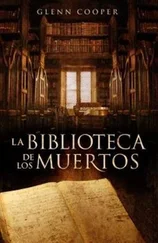Glenn Cooper - Library of the Dead
Здесь есть возможность читать онлайн «Glenn Cooper - Library of the Dead» весь текст электронной книги совершенно бесплатно (целиком полную версию без сокращений). В некоторых случаях можно слушать аудио, скачать через торрент в формате fb2 и присутствует краткое содержание. Жанр: Триллер, на английском языке. Описание произведения, (предисловие) а так же отзывы посетителей доступны на портале библиотеки ЛибКат.
- Название:Library of the Dead
- Автор:
- Жанр:
- Год:неизвестен
- ISBN:нет данных
- Рейтинг книги:3 / 5. Голосов: 1
-
Избранное:Добавить в избранное
- Отзывы:
-
Ваша оценка:
- 60
- 1
- 2
- 3
- 4
- 5
Library of the Dead: краткое содержание, описание и аннотация
Предлагаем к чтению аннотацию, описание, краткое содержание или предисловие (зависит от того, что написал сам автор книги «Library of the Dead»). Если вы не нашли необходимую информацию о книге — напишите в комментариях, мы постараемся отыскать её.
Library of the Dead — читать онлайн бесплатно полную книгу (весь текст) целиком
Ниже представлен текст книги, разбитый по страницам. Система сохранения места последней прочитанной страницы, позволяет с удобством читать онлайн бесплатно книгу «Library of the Dead», без необходимости каждый раз заново искать на чём Вы остановились. Поставьте закладку, и сможете в любой момент перейти на страницу, на которой закончили чтение.
Интервал:
Закладка:
"Good evening, Father." His accent was thick as honey.
"Good evening, Jose."
The abbot favored Jose above all of the younger brothers because of his intellect, his skill as a manuscript illustrator, and his good humor. He was seldom gloomy, and when he became amused, his laugh reminded the older man of the laughter he had heard many years earlier booming from the mouth of his friend Matthias, the blacksmith who had forged the abbey bell.
"How is the night air?" the abbot asked.
"It is fragrant, Father, and filled with cricket-song."
With the Chapter House dark, Jose left two candles burning in the abbot's chamber, one on his study table, the other by his bedside, and bade his superior good night. Alone, Josephus knelt by his bed and prayed the same prayer he had uttered since the day he became abbot: "Dear Lord, please bless this humble servant who strives to honor you each and every day and give me the strength to be the shepherd of this abbey and to serve your ends. And bless your vessel, Octavus, who toils endlessly to fulfill your divine mission, for you command his hand just as you command our hearts and minds. Amen."
Then Josephus blew out the last candle and climbed into his bed.
When the Bishop of Dorchester asked his new abbot whom he wanted to serve as prior, Josephus was quick to suggest Sister Magdalena. To be sure, there was no one better suited for the task. Her sense of organization and duty were un-surpassed among the ranks of the ministers. But Josephus had another motive, which had always made him uneasy. He needed her cooperation to protect the mission he believed Octavus was meant to accomplish.
She was the first Prioress of Vectis, and she prayed eagerly to be forgiven for the pride she felt every day. Josephus allowed her to attend to all details of the administration of the abbey, just as he had for Oswyn, and he listened patiently to her daily reports on the abuses and transgressions she ferreted out so energetically. Vectis, he acknowledged, was certainly more efficient and regimented than under his reign as prior. Yes, there was perhaps more grumbling over small matters, but he deigned to intervene only when he perceived Magdalena's actions excessive or cruel.
Instead he concentrated his attentions on prayer, the completion of the abbey's construction, and, of course, the boy, Octavus.
The latter two preoccupations intersected at the Scriptorium. Upon Oswyn's death, Josephus revisited the plans for the new Scriptorium and decided it must be even grander, since he fervently believed that the holy books and texts produced at Vectis were vital work for the betterment of mankind. He foresaw a future where ever more monks might produce more manuscripts, and the abbey and all Christendom would be elevated by their efforts.
Furthermore, he wanted a private chamber to be constructed, an inner sanctorum within the building where Octavus could work unimpeded. It was to be a special, protected place where he could transcribe the names that brewed inside him and poured onto the page as ale from a tapped barrel.
The cellar of the Scriptorium was dark and cool, perfect for the storage of large sheets of vellum and jars of ink but also well-suited for a boy who had no desire to play in the sunshine or walk in a meadow. A walled-off room was built in one end of the cellar, and there, behind a latched door, Octavus lived his life in perpetual candlelit darkness. His sole motivation was to sit on his stool, lean into his writing desk, and furiously dip his quill over and over and over again and scribble onto parchment until he collapsed in fatigue and had to be carried to his bed.
Because of his zeal for his vocation, Octavus rarely slept more than a few hours a day and would always wake without prompting, seemingly renewed. Whenever Paulinus first entered the Scriptorium in the morning, the boy was already hard at work. A young sister or novice would bring him his meals, dutifully avoiding contact with his handiwork, then empty his chamber pot and bring fresh tallow candles. Paulinus would collect the precious finished pages and bind them into heavy, thick, hide-covered books when there were sufficient numbers.
As Octavus grew from a small boy to a young man, his body elongated as if a baker had been pulling on warm dough. His appendages were spindly, almost rubbery, and his complexion, like bread dough, was pallid, without a trace of color. Even his lips were bleached out, with only the lightest tinge of pink. Had Paulinus not seen drops of crimson ooze from parchment cuts on his fingers, he would have supposed the lad was bloodless.
Unlike most boys, who upon maturation lose their delicate faces, Octavus's jaw did not go square and his nose did not spread. He maintained a boyish physiognomy that defied explanation, but then again, his very existence defied explanation. His fine hair remained bright ginger. Every month or so, Paulinus would summon the barber to trim his locks while he wrote, or better yet, while he slept, and clumps of carrot-colored hair would litter the floor until one of the girls who attended him swept them up.
The girls who, under oaths of secrecy, were permitted to feed him and dispose of his waste, were in awe of his stone-silent beauty and his absolute concentration, although one boldly mischievous novice, a fifteen-year-old named Mary, would sometimes make unsuccessful attempts to attract his gaze by dropping a goblet or clattering a plate.
However, nothing could distract Octavus from his work. The names rushed from his quill to the page in the hundreds, thousands, tens of thousands.
Paulinus and Josephus would often stand over him in a kind of reverie, watching the frantic scratching of his quill. While many entries were of the Roman alphabet, many were not. Paulinus recognized Arabic, Aramaic, and Hebraic scripts, but there were others he could not decipher. The boy's pace was furious, defying the absence of tension or urgency in his countenance. When the quill dulled, Paulinus would substitute another, so the lad could keep his letters tight and small. He packed his pages so densely that a finished page was more black than white. And when a page was done, he would turn it over and keep writing, drawing on some innate sense of parsimony or efficiency. Only when both sides were filled would Octavus reach for a clean sheet. Paulinus, arthritic and with a perpetually knotted stomach, would inspect each completed page, nervously wondering whether he might spot a name of particular interest: Paulinus of Vectis, for example.
Sometimes Paulinus and Josephus talked about how marvelous it would be to ask the lad what he thought about his life's work and for him to offer a cogent explanation. But they might as well have wished for a cow to explain what its existence meant to her. Octavus never met their gaze, never responded to their words, never showed emotion, never spoke. Over the years, the two aging monks often discussed the purpose of Octavus's industry in a biblical context. God, the omniscient and eternal, knows all things of the past and the present, but also of the future, they both agreed. All of the events of the world are surely predetermined by dint of God's vision, and the Creator had apparently chosen the miraculously born Octavus as his living quill to record what was to be.
Paulinus possessed a copy of the thirteen books written by St. Augustine, his Confessions. The monks at Vectis held these volumes in high esteem since Augustine was a spiritual beacon to them, second only to St. Benedict. Josephus and Paulinus pored over the volumes and could almost hear the venerable saint speaking to them through time in this passage: God decides the eternal destinations of each person. Their fate follows according to God's choice.
Wasn't Octavus manifest proof of that assertion?
At first Josephus stored the leather-bound books in a rack against a wall in Octavus's chamber. By the time the boy was eight he had filled ten bulky books and Josephus had a second rack built. As he grew older, his hand grew faster, and in recent years he was producing some ten books a year. When the total number of volumes exceeded seventy and threatened to crowd out his chamber, Josephus decided the books must have their own place.
Читать дальшеИнтервал:
Закладка:
Похожие книги на «Library of the Dead»
Представляем Вашему вниманию похожие книги на «Library of the Dead» списком для выбора. Мы отобрали схожую по названию и смыслу литературу в надежде предоставить читателям больше вариантов отыскать новые, интересные, ещё непрочитанные произведения.
Обсуждение, отзывы о книге «Library of the Dead» и просто собственные мнения читателей. Оставьте ваши комментарии, напишите, что Вы думаете о произведении, его смысле или главных героях. Укажите что конкретно понравилось, а что нет, и почему Вы так считаете.












